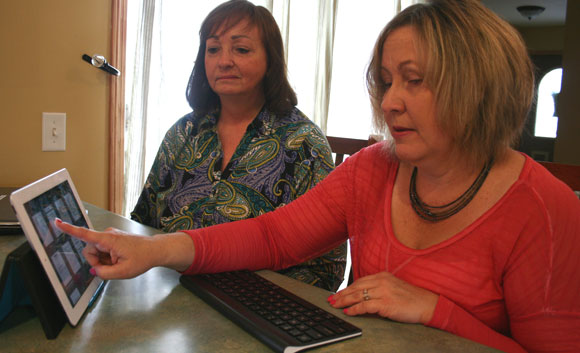
Before losing her vision, Cyrena had worked for many years in Human Resources at Opportunity Enterprises. At the time of her accident, she was the Director of Human Resources, and really enjoyed her career. Despite her vision loss, Cyrena knew there was adaptive technology available which could provide her the opportunity to continue working, and hoped to keep her position at OE.
Her vision loss allowed her to receive funding through Vocational Rehabilitation to purchase adaptive equipment and receive training to use it, so she began working with OE’s Assistive Technology Instructor Pam White to find and use adaptive technologies, which included screen magnifiers, 20/20 pens, hand held magnifiers, voice recorders, and dots for tactile marks. These items allowed her to continue working for several months, but as time went on, Cyrena came to the realization that because of all she had been through, the demands of her job were extremely mentally and physically exhausting, and more than she could handle. Reluctantly, she left OE.
Years passed and Cyrena continued to adjust to her vision loss. She received Orientation & Mobility Training with the use of a white cane, learned the Braille alphabet and numbers, and made many modifications to her home, all of which allowed her to regain her independence. Eventually Porzel purchased an iPhone, which included features such as voice activation and accessible apps which assist people with vision loss.
In October of 2012, Cyrena went back to Pam White for further assessments of devices and training that could help her. As a result, an iPad was purchased, and White provided training to help Cyrena learn how to use it.
"I love my Apple devices!” shares Porzel. “I thought before I started working with Pam that I knew quite a bit about using them, but I gained further knowledge and additional insight through my training.”
Through her Vocational Rehabilitation funding, Cyrena has also purchased additional adaptive equipment, including Pen Friend and KNFB Reader, which reads aloud almost any typed text that it scans. With White’s help, Cyrena has learned to use adaptive equipment to help with many daily functions, such as reading newsletters and bulletins that her kids bring home from school. She has also found this technology can be especially helpful in the kitchen, where she has started labeling items, starting with all of the spices in her pantry, medication bottles, and food products so they can be read out loud to her.
“Pam is wonderful and has patience when she trains you. She takes all the time in the world, and ensures you know what you’re doing. If you have a problem, she guides you to fix it,” says Cyrena. “Pam is awesome!”
Today, after surgery and years of recovery, Cyrena still has no vision in her left eye. She has regained a limited amount of vision in her right eye, but is legally blind. She has good days and bad days, but is adjusting to her new life. She enjoys audio books, baking, taking walks, and being home with her children, Austen and Ashley, and attending their school activities. Cyrena is also extremely thankful for the love and support of her husband of 20 years.
“We went through this together. It has changed both of our lives, and brought us closer,” she says.
With 14 years of human resources experience, Cyrena does hope to return to work someday, and has started volunteering at OE to get used to using adaptive technology in the workplace.
“This experience has taught me patience for sure – things take longer than they used to.” Cyrena says, “But with the help of adaptive technology, I can still do many of the things I used to do, and I’m extremely thankful for it.”
“OE’s JobSource program is a great resource for our community,” says David Stupay, President/CEO of Opportunity Enterprises. “For people like Cyrena whose injury or illness later in life results in a disability, adaptive technology can help them continue living and working independently. There is a growing demand for these services, and in order to continue to place people in high quality jobs, OE remains committed to providing cutting edge technology and training to the people we serve.”
JobSource has more than 20 years of experience placing and supporting qualified individuals with disabilities in community employment, and utilizes innovative protocols to ensure success. Services include pre-vocational training programs, placement screening processes, on-site job coaching, and an assistive technology program that features computer adaptations for clients with physical, visual, developmental and/or learning disabilities.
JobSource has offices in Porter, Lake, and LaPorte Counties, which allows the program to serve all of Northwest Indiana and Chicagoland, and has successfully placed individuals with disabilities in a wide range of careers from entry-level to professional positions. JobSource is the preferred employment agency for more than 100 businesses throughout the region.
To find out more about the JobSource program, visit www.oppent.org or contact program director Kathie Savich kathie.savich@oppent.org or (219) 510-5330, ext. 213.
Since 1967, OE has been a non-profit organization which works to maximize self-sufficiency and enrich the quality of life for individuals with disabilities. Today, OE serves 1,100 adults and children with disabilities in Porter County and throughout Northwest Indiana. For more information, visit www.oppent.org.